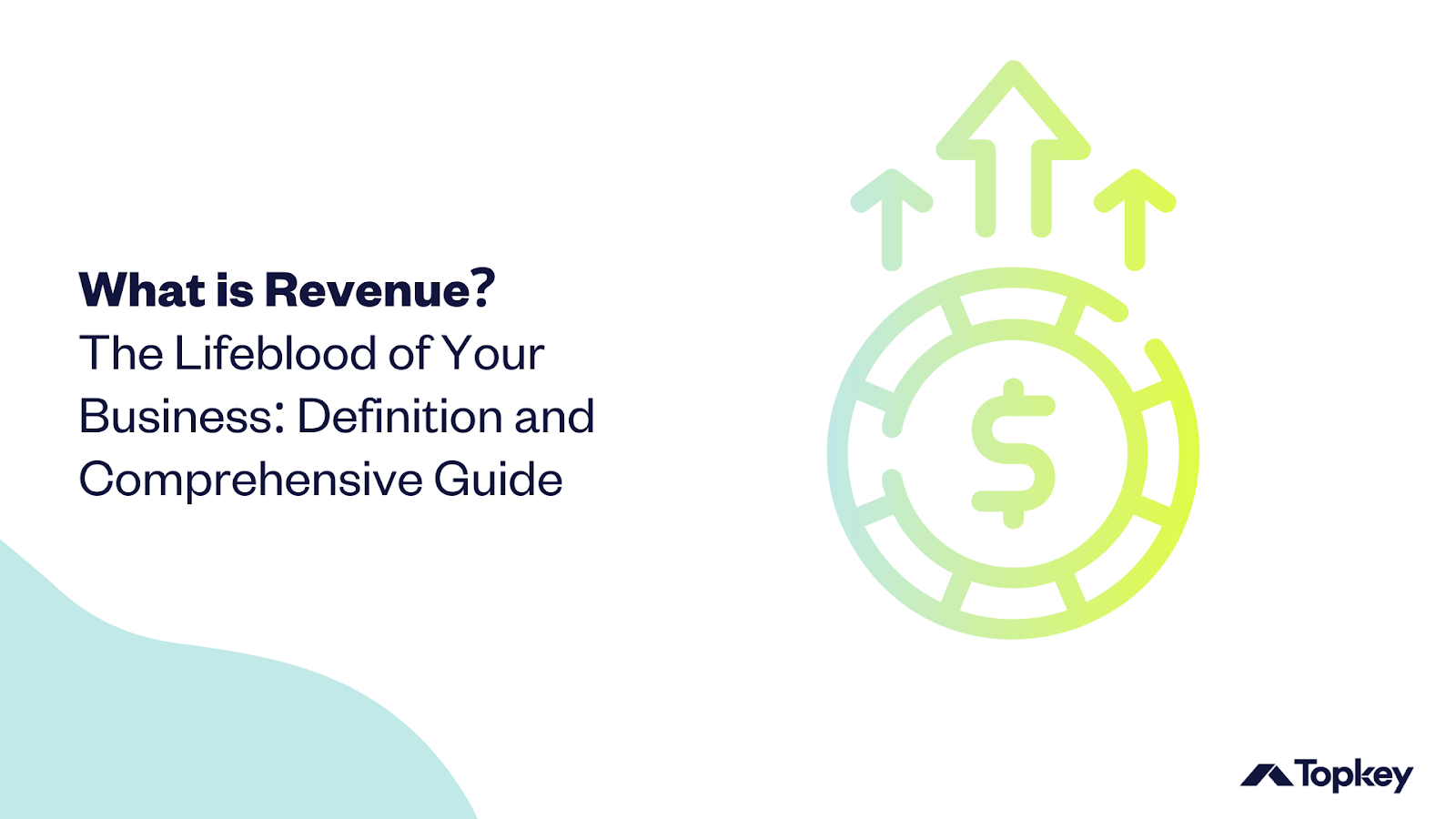
Introduction: Why Understanding Revenue is Crucial for Business Growth
Revenue. It's more than just a number; it's the lifeblood that sustains every business, regardless of size or industry. Think of it as the very first signal of how well your products or services are resonating with the market. Without a healthy stream of revenue, operations can't continue, and dreams of growth and expansion remain just that – dreams.
For business owners and stakeholders alike, truly grasping what revenue entails is paramount for making informed decisions. From setting realistic budgets and forecasting future growth to attracting crucial investors, the ability to accurately measure and interpret revenue is absolutely essential. Let's dive in and demystify this vital concept.
What is Revenue? A Simple and Clear Definition
At its core, revenue is the total amount of money your business earns from its primary activities – typically the sale of goods or services – before any expenses are deducted. You might also hear it called "sales" or "turnover." It sits right at the top of your company's income statement, which is why it's often referred to as "top-line" revenue.
Consider a local coffee shop that sells 500 lattes at $4 each in a week. Their revenue for that week would be $2,000 (500 lattes x $4/latte). This simple calculation is the foundation upon which more complex financial analyses are built.
Revenue vs. Income vs. Profit: Decoding the Key Differences
One area that often causes confusion for business owners is distinguishing between revenue, income, and profit. While all are important, they represent different stages of your business's financial performance.
Think of it like this: Revenue is the whole pie – the total earnings from your sales. Income, also known as net profit, is the slice of pie you have left after you've taken out all the other slices representing your expenses – things like rent, salaries, marketing costs, and utilities. Profit, essentially, is your business's financial reward after covering all those costs.
To put it more formally:
- Revenue (Gross Revenue): Total earnings from primary business activities.
- Income (Net Profit): Revenue minus all expenses.
- Profit: Often used interchangeably with net profit or net income.
Understanding these distinctions is crucial for a clear picture of your business's financial health.
Different Types of Revenue Streams for Businesses
Revenue isn't a one-size-fits-all concept. It comes in various forms, each playing a unique role in your financial management:
- Operating Revenue: This is the revenue generated from your company's core business activities. For a Software-as-a-Service (SaaS) company like Topkey, which provides financial automation software for vacation rental property managers, operating revenue comes from subscription fees. For a restaurant, it's the money earned from selling food and beverages.
- Non-Operating Revenue: This is income derived from secondary sources that aren't directly related to your main business. Examples include interest earned on investments, income from selling property, or a one-time gain from selling old equipment.
- Recurring Revenue: This type of revenue is predictable and consistent, often generated through subscriptions or long-term contracts. Think of the monthly fees collected by streaming services like Netflix or software providers like Adobe. This predictability is highly valued by investors.
- Non-Recurring Revenue: This includes one-off payments or sales that aren't expected to repeat regularly. Examples include a single consulting project fee or the sale of a unique, limited-edition product.
How to Calculate Revenue: A Step-by-Step Guide
Calculating your business's revenue is usually a straightforward process:
- For Product-Based Businesses: Multiply the number of units sold by the price per unit. For example, if a local artisanal soap maker sells 300 bars of soap at $8 each during a craft fair, their gross revenue from the fair would be $2,400 (300 bars x $8/bar).
- For Service-Based Businesses: Multiply your hourly rate by the total number of hours worked. If a freelance marketing consultant charges $100 per hour and bills for 50 hours of work in a month, their revenue for that period is $5,000 (50 hours x $100/hour).
Don't Forget Deductions! When calculating your net revenue, it's crucial to consider deductions such as discounts offered to customers, the value of returned goods, and any allowances given. These deductions can significantly impact your business's actual earnings.
Gross Revenue vs. Net Revenue: What's the Real Picture?
- Gross Revenue is the total income from your sales before any deductions. It's the initial top-line figure.
- Net Revenue is what's left after you subtract all those deductions (discounts, returns, allowances). This figure provides a much clearer picture of your business's actual earnings.
Imagine an online clothing retailer with a gross revenue of $25,000 in a month. However, they offered $1,500 in promotional discounts and had $750 worth of returned items. Their net revenue would be $22,750 ($25,000 - $1,500 - $750). Net revenue is the figure businesses use to truly understand their profitability and manage their cash flow effectively.
Examples of Revenue in Different Industries: A Look at Real-World Applications
Revenue streams look different depending on the industry:
- Retail: Revenue is generated from direct sales of products, whether in physical stores or online.
- SaaS (Software as a Service): The primary revenue model is typically subscription fees paid by users for accessing the software.
- Hospitality (e.g., Vacation Rentals): Revenue comes from nightly or weekly rental fees, plus additional charges for services like cleaning, early check-in, or late checkout.
- Restaurants: Revenue is earned from dine-in customers, takeout and delivery orders, catering services, and sometimes even hosting private events.
Understanding these industry-specific revenue streams is vital for accurate financial management, benchmarking against competitors, and effective forecasting.
Why Revenue is Important for Growth & Business Valuation
Revenue isn't just about the money coming in today; it's a critical indicator of your business's future potential and overall health. Consistent and growing revenue signals strong market acceptance and high demand for your offerings, making your company more attractive to potential investors and lenders.
Furthermore, revenue plays a key role in determining your business's valuation, especially for tech startups and SaaS companies. Valuations are often based on revenue multiples (e.g., a company might be valued at 5 times its annual recurring revenue). A strong revenue stream significantly enhances your company's ability to secure funding, finance expansion plans, and drive strategic growth initiatives.
Common Mistakes and Misconceptions About Revenue
It's easy to stumble when it comes to understanding revenue. Here are some common pitfalls to avoid:
- Confusing High Revenue with High Profit: Don't be fooled by large revenue numbers alone. A high top line can sometimes mask underlying issues if your expenses aren't well-managed. Profitability depends on controlling costs effectively.
- Improperly Accounting for Discounts and Returns: Failing to accurately track and deduct discounts and returns can lead to an inflated and unrealistic view of your actual revenue.
- Misclassifying Revenue: Treating non-operating revenue as operating revenue can distort your core business performance metrics and lead to poor strategic decisions. For example, a one-time sale of equipment shouldn't be seen as part of your regular sales revenue.
Applying Revenue Principles to Vacation Rental Property Managers
For vacation rental property managers, revenue isn’t just about how many nights you book, it’s about fully understanding where your income is coming from, how it’s structured, and how you can grow it strategically.:
What Counts as Revenue in Vacation Rentals?
Your operating revenue typically includes:
- Nightly or weekly rental fees collected from guests
- Cleaning fees (when retained, not passed to vendors)
- Pet fees, extra guest fees, or resort fees
- Premium add-ons like early check-in, late check-out, concierge services, or equipment rentals
In some cases, you may also have:
- Non-operating revenue, like affiliate commissions from local tour operators, or interest earned on trust account balances.
Gross vs. Net Revenue: Why It Matters in STR
Let’s say you manage 50 properties and earned $250,000 in gross booking revenue for a summer month. However:
- You refunded $10,000 for cancellations
- You offered $5,000 in last-minute discounts
- You passed $30,000 in cleaning fees directly to a third-party cleaner
Your net revenue would be significantly lower — closer to $205,000 — and that's what should inform your financial planning, P&L reports, and owner statements.
Recurring and Non-Recurring Revenue in Property Management
While short-term rentals don’t always have traditional "subscriptions," some revenue streams are more predictable:
- Recurring: Long-term stays, monthly direct booking memberships, repeat guests, or managed service contracts
- Non-recurring: One-off event bookings (e.g., weddings), seasonal rate spikes, or large group stays
Identifying and growing your recurring revenue makes your business more stable and attractive to partners, investors, and potential buyers.
Why Revenue Understanding Is Crucial for Property Managers
- Owner Reporting: Accurate revenue tracking helps you produce clear, detailed statements for your homeowners — and maintain trust.
- Forecasting: Understanding seasonal revenue trends helps you predict cash flow and make hiring, marketing, or tech investment decisions with confidence.
- Profitability: With tools like Topkey, you can connect your PMS, accounting software, and banking to monitor revenue, track expenses in real-time, and identify where you’re losing margin (like undercharging for add-ons or missing reimbursable fees).
Frequently Asked Questions (FAQ) About Revenue
- Q: What is the basic definition of revenue?
- A: Revenue is the total amount of money a business earns from its primary sales activities before deducting any expenses.
- Q: How does revenue differ from profit?
- A: Revenue is the top-line figure, while profit (or net income) is what remains after all business expenses have been subtracted from the revenue.
- Q: What are the main types of revenue a business can have?
- A: Common types include operating revenue (from core activities), non-operating revenue (from secondary sources), recurring revenue (predictable income), and non-recurring revenue (one-time sales).
- Q: How do you calculate gross revenue for a product-based business?
- A: Gross revenue is calculated by multiplying the total number of units sold by the price per unit.
- Q: What is the significance of net revenue?
- A: Net revenue provides a more accurate picture of a business's actual earnings after accounting for discounts, returns, and allowances. It's crucial for assessing profitability.
- Q: Why is revenue important for business growth?
- A: Consistent and increasing revenue indicates market demand, attracts investors, and provides the financial foundation for expansion and strategic initiatives.
- Q: What are some common misconceptions about revenue?
- A: Common mistakes include confusing high revenue with high profit and failing to properly account for deductions like discounts and returns.
- Q: How can understanding revenue help business owners?
- A: A clear understanding of revenue enables better financial planning, more informed decision-making, accurate performance evaluation, and improved communication with stakeholders.
Key Takeaways About Revenue for Business Success
In conclusion, revenue is the fundamental building block of financial understanding for every business owner. Knowing precisely what revenue is, how to calculate it accurately (both gross and net), and how it differs from profit and income provides invaluable financial insight and empowers you to make better-informed decisions.
Whether you're a seasoned entrepreneur or just starting your business journey, clearly distinguishing between revenue types and diligently managing your revenue calculations are crucial steps toward achieving sustained success and driving meaningful growth for your company. Remember, a healthy revenue stream is the engine that fuels your business's ambitions.
See the Topkey difference.


